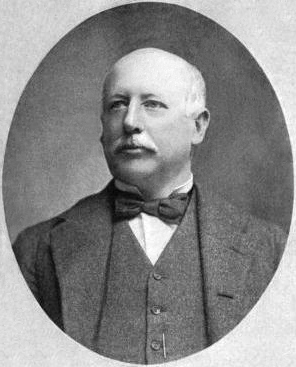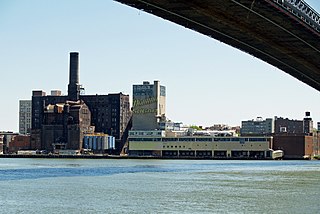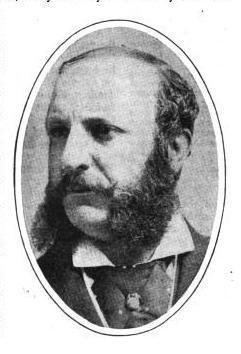
Tate & Lyle PLC is a British-headquartered, global supplier of food and beverage ingredients to industrial markets. It was originally a sugar refining business, but from the 1970s, it began to diversify, eventually divesting its sugar business in 2010. It specialises in turning raw materials such as corn and tapioca into ingredients that add taste, texture, and nutrients to food and beverages. It is listed on the London Stock Exchange and is a constituent of the FTSE 250 Index.

A sugar refinery is a refinery which processes raw sugar from cane or sugar extracted from beets into white refined sugar.

Golden syrup or light treacle is a thick, amber-coloured form of inverted sugar syrup made by the process of refining sugar cane or sugar beet juice into sugar, or by treatment of a sugar solution with acid. It is used in a variety of baking recipes and desserts. It has an appearance and consistency similar to honey, and is often used as a substitute where honey is unavailable.

Redpath Sugar Ltd. is a Canadian sugar refining company that was established in 1854 and the first refining cane sugar in Montreal, Quebec. Headquartered in Toronto, Ontario, the company is a subsidiary of the multinational American Sugar Refining.
The Spreckels Sugar Company is an American sugar beet refiner that for many years controlled much of the U.S. West Coast refined sugar market. It is currently headquartered in Brawley, California.

California and Hawaiian Sugar Company is an American sugar processing and distribution company. Originally organized as a co-operative in 1921, it encountered a severe decline in sugar markets and passed through a series of owners in the latter half of the 20th century. In 2017, its Crockett, California, refinery processed its last shipment of Hawaiian sugar but continues to produce sugar from other locations. The Crockett Refinery employs more than 450 people and produces 14% of the nation's cane sugar.

Henry Osborne Havemeyer was an American industrialist, entrepreneur and sugar refiner who founded and became president of the American Sugar Refining Company in 1891.

Abram Lyle was a Scottish food manufacturer and politician, who is noted for founding the sugar refiners Abram Lyle & Sons in 1887, which merged with the company of his rival Henry Tate to become Tate & Lyle in 1921.

Domino Foods, Inc. is a privately held sugar marketing and sales company based in Yonkers, New York, United States, that sells products produced by its manufacturing members. DFI distributes sugar to retailers under four brand names across the U.S: Domino,C&H,Florida Crystals, and Redpath. Its namesake product, the Domino Sugar brand name, whose products are generally sold in two-tone packaging with blue labeling text, is the best known. Domino Foods is the largest sugar company in the United States.
The Fanjul brothers—Cuban born Alfonso "Alfy" Fanjul Jr., José "Pepe" Fanjul, Alexander Fanjul, and Andres Fanjul—are owners of Fanjul Corp., a vast sugar and real estate conglomerate in the United States and the Dominican Republic. It comprises the subsidiaries Domino Sugar, Florida Crystals, C&H Sugar, Redpath Sugar, former Tate & Lyle sugar companies, American Sugar Refining, Central Romana Corporation, La Romana International Airport, and resorts surrounding La Romana, Dominican Republic.

American Sugar Refining, Inc. is a large privately held cane sugar refining company, with a production capacity of 6.5 million tons of sugar. The company produces a full line of consumer, industrial, food service, and specialty sweetener products. In 2013, it adopted the corporate brand name ASR Group. Its ownership structure is based on a partnership which includes the Florida Crystals Corporation, part of FLO-SUN, a sugar empire of the Fanjul brothers whose origins go back to Spanish-Cuban sugar plantations of the early 19th century.

Theodore Augustus Havemeyer was an American businessman who was the first president of the U.S. Golf Association and co-founder of the Newport Country Club, host to both the first U.S. Amateur and the first U.S. Open in 1895.
Sugar Cane Growers Cooperative of Florida is a vertically integrated agricultural enterprise that harvests, transports and processes sugarcane grown primarily in Palm Beach County, Florida and markets the raw sugar and blackstrap molasses through the Florida Sugar and Molasses Exchange. The Cooperative is made up of 45 grower-owners who produce sugarcane on approximately 70,000 acres of some of the most fertile farmland in America, located in the Everglades Agricultural Area (EAA). Sugarcane grown by Cooperative members is harvested, transported and processed. The raw sugar is then marketed to one of the ASR Group's sugar refineries. The Cooperative produces more than 350,000 tons of raw sugar annually.

The Domino Sugar Refinery is a mixed-use development and former sugar refinery in the neighborhood of Williamsburg in Brooklyn, New York City, along the East River. When active as a refinery, it was operated by the Havemeyer family's American Sugar Refining Company, which produced Domino brand sugar and was one of several sugar factories on the East River in northern Brooklyn.
Charles Esau Eastick was a British chemist, noted for formulating golden syrup and patenting special methods for making brewers' saccharum and inverted sugar.

Domino Park is a 5-acre (2.0 ha) public park in the Williamsburg neighborhood of Brooklyn, New York City. It spans a quarter mile along the East River near the Williamsburg Bridge, at the Domino Sugar Refinery site. Along the five-block riverside walk, various salvaged factory equipment is displayed, including four syrup collection tanks, that pay tribute to the history of the Domino Sugar Refinery.
The Havemeyer family is a prominent New York family of German origin that owned significant sugar refining interests in the United States.
The sugar industry of the United States produces sugarcane and sugar beets, operates sugar refineries, and produces and markets refined sugars, sugar-sweetened goods, and other products. The United States is among the world's largest sugar producers. Unlike most other sugar producing countries, the United States has both large and well-developed sugarcane and sugar beet industries. Refined sugarcane, processed sugar beet, and high-fructose corn syrup are all commonly used in the U.S. as added sugars to sweeten food and beverages.

John Arbuckle was an American businessman who founded Arbuckle Brothers Company, a coffee roasting and sugar refining company.
The Franklin Sugar Refinery was a steam powered, brick building which began construction in 1866 on Almond and Swansons Streets by the Delaware River in Philadelphia, Pennsylvania, in the United States. Two decades later it had expanded into the surrounding blocks. The Franklin Sugar Refining Company was formed as a corporation controlled by various firms of which Charles Custis Harrison was the senior partner. In 1892 the Franklin Sugar Refinery was sold to the American Sugar Refining Company in an effort to monopolize the sugar refining industry within the United States. It continued to operate under the same name for several decades. Other refineries operating in Philadelphia at that time were the Spreckels Company, the Pennsylvania Sugar Refining Co., and E.C. Knight & Co.











